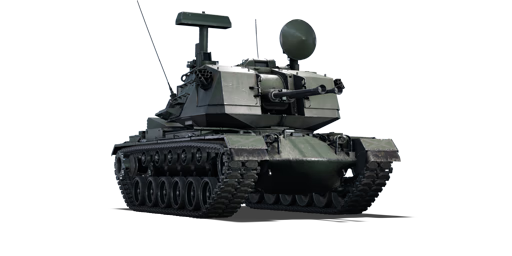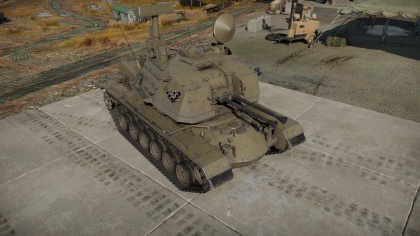M247
Contents
Description
The Gun, Air Defence Artillery, Self-Propelled, 40-mm, M247 is a Rank American self-propelled anti-aircraft gun
with a battle rating of (AB), (RB), and (SB). It was introduced in Update 1.81 "The Valkyries".
General info
Survivability and armour
Armour type:
- Cast homogeneous armour (Hull)
- Rolled homogeneous armour (Rear (low), Roof, Turret)
| Armour | Front (Slope angle) | Sides | Rear | Roof |
|---|---|---|---|---|
| Hull | 85-200 mm (59-74°) Front glacis 63-200 mm (13-60°) Lower glacis |
76 mm (8-43°) Front 51 mm (0-43°) Rear |
35 mm (26-32°) Top 25 mm (61-62°) Bottom |
57 mm |
| Turret | 25.4 mm (15-76°) Turret front (Upper) 12.7 mm (40-69°) Turret front (Lower) 25.4 mm (0-87°) Gun mantlet |
12.7-25.4 mm (0-19°) Upper 12.7 mm (40-69°) Lower |
12.7 mm (18°) | 12.7 mm |
Notes:
- Suspension wheels and tracks are 20 mm thick.
- Belly armour is 38 mm in the front and 25 mm in the rear.
Mobility
| Game Mode | Max Speed (km/h) | Weight (tons) | Engine power (horsepower) | Power-to-weight ratio (hp/ton) | |||
|---|---|---|---|---|---|---|---|
| Forward | Reverse | Stock | Upgraded | Stock | Upgraded | ||
| Arcade | Expression error: Unexpected * operator. | 1065 | Expression error: Unexpected round operator. | __.__ | |||
| Realistic | 663 | Expression error: Unexpected round operator. | __.__ | ||||
The M247's turret is installed on the hull of an M48 medium tank, because of this they have roughly similar mobility. The M247 is about 3 tons heavier than the M48A1 (49.3 tons vs. 46.4 tons), and has a slightly weaker engine, which translates into a slightly more sluggish machine compared to the M48A1. The M48A1 has a max engine power of 810 hp, while the M247's engine power is 750 hp. For a vehicle this heavy, it has fairly good mobility. When spaded, it can comfortably hit a top speed of 45 km/h on flat terrain, while in cross-country you will have a top speed of around 25 km/h. While going backwards, the top speed is somewhat less impressive: about -9 km/h.
Armaments
| 40 mm M266 Automatic Cannon (x2) | |||||
|---|---|---|---|---|---|
| Capacity (Belt capacity each) | Fire rate (shots/minute) |
Vertical guidance |
Horizontal guidance | ||
| 560 (280) | 300 | -5°/+85° | ±180° | ||
| Turret rotation speed (°/s) | |||||
| Mode | Stock | Upgraded | Prior + Full crew | Prior + Expert qualif. | Prior + Ace qualif. |
| Arcade | 52.8 | ? | ? | ? | ? |
| Realistic | 35.7 | ? | ? | ? | ? |
| Reloading rate (seconds) | |||||
| Stock | Prior + Full crew | Prior + Expert qualif. | Prior + Ace qualif. | ||
| 6.5 | ? | ? | ? | ||
Ammunition
| Penetration statistics | |||||||
|---|---|---|---|---|---|---|---|
| Ammunition | Type of warhead |
Penetration in mm @ 90° | |||||
| 10m | 100m | 500m | 1000m | 1500m | 2000m | ||
| M811 | HEFI-T* | 5 | 5 | 5 | 5 | 5 | 5 |
| M822 | HEFI-T* | 5 | 5 | 5 | 5 | 5 | 5 |
| 40 mm AP-T | AP-T | 93 | 90 | 77 | 62 | 51 | 41 |
| Shell details | ||||||||||
|---|---|---|---|---|---|---|---|---|---|---|
| Ammunition | Type of warhead |
Velocity in m/s |
Projectile Mass in kg |
Fuse delay
in m: |
Fuse sensitivity
in mm: |
Explosive Mass in g (TNT equivalent): |
Normalization At 30° from horizontal: |
Ricochet: | ||
| 0% | 50% | 100% | ||||||||
| M811 | HEFI-T* | 1100 | 0.87 | 0.2 | 0.1 | 255 | +0° | 79° | 80° | 81° |
| M822 | HEFI-T* | 1100 | 0.87 | 0.2 | 0.1 | 185 | +0° | 79° | 80° | 81° |
| 40 mm AP-T | AP-T | 1030 | 0.88 | N/A | N/A | N/A | -1° | 48° | 69° | 79° |
Belt types
| Belts | Shell composition | Combat usage |
| Default | HEFI-T* / AP-T | Good general ammunition, a hit on an aircraft typically means its destruction while still enough to do damage to armoured ground vehicles, especially if it shoots into the side of an enemy tank (weaker armour). Good to start with until comfortable with other types of ammunition. |
| 40 mm AP-T | AP-T / AP-T / AP-T / HEFI-T* | Very powerful ammunition which can be used against ground targets with significantly more penetration than other 35-40 mm AP-T projectiles. Will easily destroy any target with side shots even outside the point-blank range and can destroy lighter targets and weak spots from the front even against main battle tanks. |
| M811 | HEFI-T* / HEFI-T* / HEFI-T* / AP-T | "Poor man's anti-air ammunition." Unlike the M822 shells these require direct hits to do significant damage, but if problems are experienced with M822 detonating too early this belt may be your best choice. |
| M822 | HEFI-T* / HEFI-T* / AP-T | Proximity-fused shells that absolutely obliterate aircraft when they make contact, though if they detonate too early, they will do little to no damage. Somewhat unreliable in if they detonate within range of the target, but when they do the target will quickly take considerable damage if not destroyed. The only ammunition for self-propelled anti-aircraft guns that which can cause enough shrapnel damage to bring down planes and helicopters even with near misses. This round should be the go-to anti-air ammunition, although the M811 is a good backup if the M822 is problematic for the gunner. |
Usage in battles
Describe the tactics of playing in the vehicle, the features of using vehicles in the team and advice on tactics. Refrain from creating a "guide" - do not impose a single point of view but give the reader food for thought. Describe the most dangerous enemies and give recommendations on fighting them. If necessary, note the specifics of the game in different modes (AB, RB, SB).
Modules
| Tier | Mobility | Protection | Firepower | |||
|---|---|---|---|---|---|---|
| I | Tracks | Parts | Horizontal Drive | M811 | ||
| II | Suspension | Brake System | FPE | Adjustment of Fire | 40 mm AP-T | |
| III | Filters | Crew Replenishment | Elevation Mechanism | Smoke grenade | NVD | |
| IV | Transmission | Engine | Laser rangefinder | Artillery support | M822 | |
Pros and cons
Pros:
- Twin stabilized 40 mm M266 cannon (L/70 40 mm Bofors) have a much higher rate of fire compared to the M42 Duster: Deadlier and more accurate
- Large ammunition count ensures that you will have plenty to fire throughout a match without fear of running out of ammo mid-game
- Has access to 12 x 66 mm smoke grenades, perfect for exiting a dangerous situation
- The M822 ammunition is proximity fused and will detonate if the projectile passes close enough to the target
- The 40 mm's pose a serious threat to lightly-armoured vehicles
- Uses the M48 Patton's hull (armour included) = one of the best-protected SPAA in the game
- Benefits in realistic battles from aim-assistance thanks to the radar
- Has access to night-vision devices for use in night battles
- Large radar sweep range to easily spot targets, as well as a large radar lock-on marker in its scope
Cons:
- As with all high-rank SPAA, the M247 has very thin turret armour; a shell strike could instantly end the vehicle
- Turret is also vulnerable to strafing aircraft + rockets
- Armour advantages are nullified due to the inclusion of the Hull Break mechanic
- No thermal sights
- Search radar cannot be folded
History
The M247 "Sergeant York" was designed in the late 1970's as a purpose-built SPAAG. It was designed to fight alongside the M1 Abrams and M2/M3 Bradley, in order to provide cover against aircraft. There were other SPAA vehicles in service at the time; these were the M163 Vulcan and the MIM-72/M48 Chaparral. The former being a 20 mm rotary cannon mounted on an armored personnel carrier, and the latter being a heavily modified armored personnel carrier chassis with a surface-to-air missile launcher. Neither of those two vehicles were designed as SPAA's, and so, did not have the necessary performance to be adequate at their job. The M247 was designed as a replacement for both of the previous vehicles.
Designs from a multitude of companies were entered into the competition. Only two were selected for testing: the Ford XM-247 with twin Bofors 40mm cannons and the General Dynamics XM-246 with twin Oerlikon 35mm cannons. The two prototypes were tested, and the XM-247 was selected as the winner, although the XM-246 had outscored it in all the shooting tests. The M247, as it was soon designated, ran into many problems. The radar was extremely deficient; it had a hard time distinguishing trees from planes, and if the guns were pointed too high, they would get in the radar's way and confuse it even more. In addition, it took too long for the radar to pick up a target and for the guns to actually take aim. In addition, the turret traverse speed was much too slow, the vehicle it's self was too sluggish to keep up the M1's and M2's, and it was unreliable in cold weather. Eventually, the program was cancelled after more testing, where it was proven the system could not even shoot down stationary drones. There was still a need for an anti-aircraft vehicle that could keep up with modern vehicles, so Oerlikon Canada created the ADATS anti-aircraft missile system. This was not as successful as hoped, and was only accepted into Canadian service. The void was eventually filled by the M6 Linebacker, an M2 Bradley with Stinger missiles instead of TOW missiles. The Linebacker was capable of keeping up with modern armored forces, which was the reason for its acceptance, even though the Stingers were not as effective as the ADATS missiles[1].
Media
Skins and camouflages for the M247 Sergeant York from live.warthunder.com.
See also
External links
- [Devblog] TAM and M247 Sergeant York
- "Sergeant York", Wikipedia.org, Accessed on 24 March 2020.
| USA anti-aircraft vehicles | |
|---|---|
| M3 Half-track derivatives | M13 MGMC · M15 CGMC · M16 MGMC |
| M24 derivative | M19A1 |
| M41 derivative | M42 |
| Radar SPAAG | M163 · M247 |
| Missile SPAA | ADATS · Imp.Chaparral · LAV-AD · XM975 |





